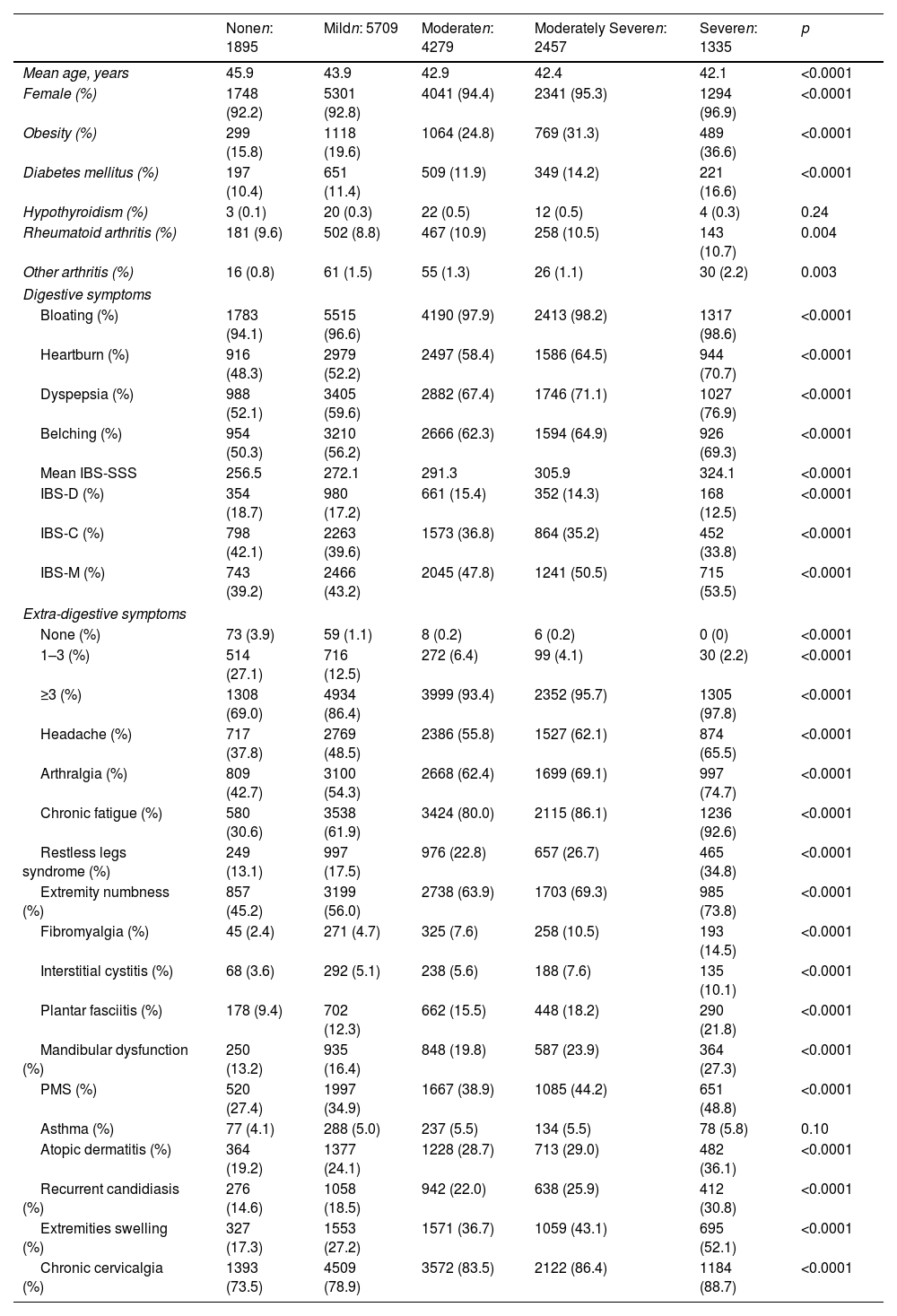We aimed to determine the prevalence of intestinal and extra-intestinal symptoms according to depression severity in a large cohort of patients with irritable bowel syndrome (IBS).
Patients and methodsA consecutive series of patients with diagnosis of IBS according to Rome IV criteria undertaking a social-media based program (B15 program) were analyzed. The B15 program provides evidence-based dietary and non-pharmacological recommendations (i.e., mindfulness techniques and exercise) to improve gastrointestinal health. All patients completed the symptom-severity questionnaire (IBS-SSS) to determine severity of disease and the patient health questionnaire (PHQ9) to assess depressive symptoms. Patients’ depression severity was stratified according to the PHQ9 score: none (0–4), mild (5–9), moderate (10–14), moderately severe (15–19), and severe (20–27). Demographics, IBS phenotype and prevalence of intestinal and extra-intestinal symptoms were compared among groups.
ResultsA total of 15,675 patients with IBS were included; 895 (12.1%) with none, 5709 (36.4%) with mild, 4279 (27.3%) with moderate, 2457 (15.7%) with moderately severe, and 1335 (8.5%) with severe depression. Mean IBS-SSS score was significantly higher in patients with depressive symptoms (none 256.5 vs. severe 324.1, p<0.0001). IBS-M (mixed bowel habits alternating constipation and diarrhea) was more frequent in those with depression (p<0.0001). The presence of bloating, heartburn, dyspepsia, and belching were significantly more common in patients with higher levels of depression (p<0.0001). The prevalence and number of extra-intestinal symptoms were also associated with the severity of depression (p<0.0001).
ConclusionsThe presence and severity of depression are strongly associated with the prevalence of intestinal and extra-intestinal symptoms in patients with IBS. Stratifying patients based on both their symptomatic and psychological profile could help targeting therapy.
Determinar la prevalencia de síntomas intestinales y extraintestinales según la gravedad de la depresión en una gran cohorte de pacientes con síndrome del intestino irritable (SII).
Pacientes y métodosSe analizó una serie consecutiva de pacientes con diagnóstico de SII según los criterios de Roma IV que participaron en un programa basado en redes sociales (programa B15). El programa B15 proporciona recomendaciones dietéticas y no farmacológicas (meditación y ejercicio) basadas en evidencia para mejorar la salud gastrointestinal. Todos los pacientes completaron el cuestionario de gravedad de los síntomas (IBS-SSS) para determinar la gravedad de la enfermedad, y el cuestionario de salud del paciente (PHQ9) para evaluar los síntomas depresivos. La gravedad de la depresión de los pacientes se estratificó según la puntuación PHQ9: ninguna (0-4), leve (5-9), moderada (10-14), moderadamente grave (15-19) y grave (20-27). Se compararon entre los grupos los datos demográficos, el fenotipo del SII y la prevalencia de síntomas intestinales y extraintestinales.
ResultadosSe incluyeron un total de 15.675 pacientes con SII; 895 (12,1%) sin depresión, 5.709 (36,4%) con depresión leve, 4.279 (27,3%) con depresión moderada, 2.457 (15,7%) con depresión moderadamente grave y 1.335 (8,5%) con depresión grave. La puntuación media del IBS-SSS fue significativamente mayor en pacientes con síntomas depresivos (ninguno 256,5 frente a grave 324,1, p<0,0001). El SII-M (hábitos intestinales mixtos que alternan estreñimiento y diarrea) fue más frecuente en aquellos con depresión (p<0,0001). La presencia de distensión, pirosis, dispepsia y eructos fue significativamente más común en pacientes con niveles más altos de depresión (p<0,0001). La prevalencia y el número de síntomas extraintestinales también se asociaron con la gravedad de la depresión (p<0,0001).
ConclusionesLa presencia y gravedad de la depresión están fuertemente asociadas con la prevalencia de síntomas intestinales y extraintestinales en pacientes con SII. Estratificar a los pacientes en función de su perfil sintomático y psicológico podría ayudar a orientar el tratamiento.











